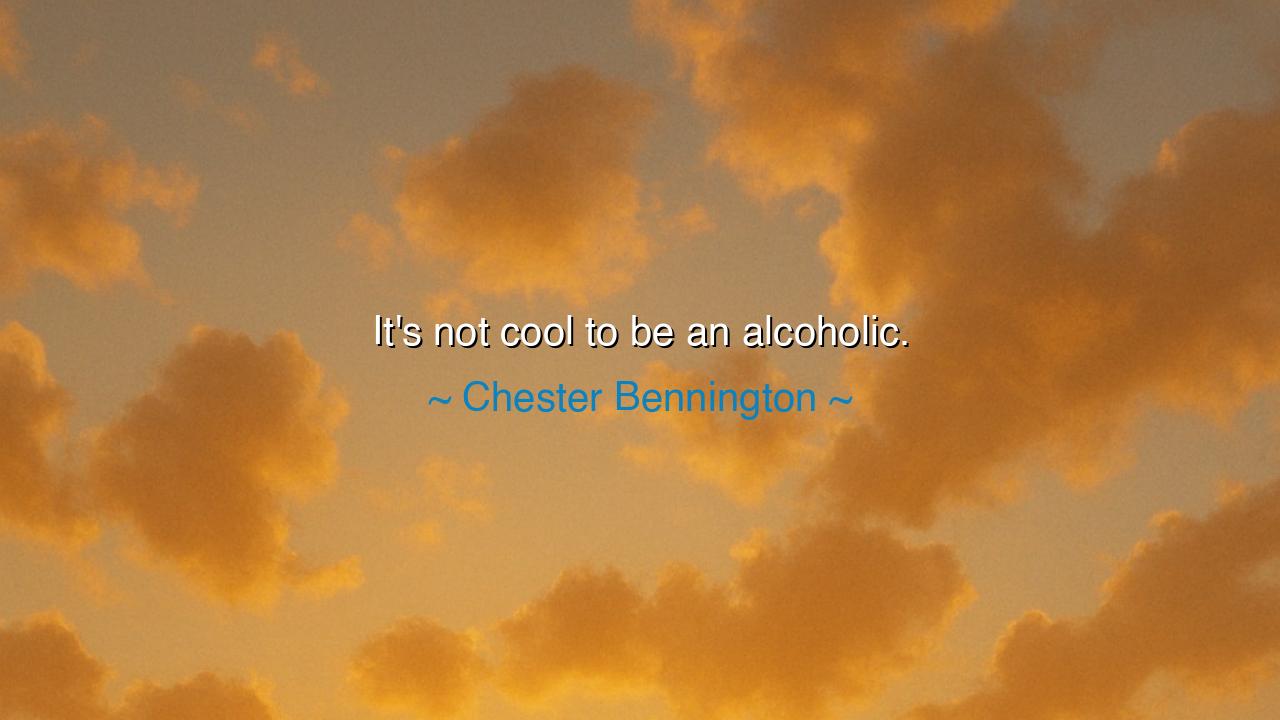
It's not cool to be an alcoholic.






"It's not cool to be an alcoholic." These candid words from Chester Bennington speak to the deep, often painful truth that certain behaviors, particularly those that may seem socially acceptable or glamorized, can actually be deeply damaging to one's well-being and future. Bennington’s statement cuts through the often romanticized notions of alcoholism and calls attention to the personal destruction that accompanies it. It is a clear reminder that true strength and coolness come not from indulging in self-destructive habits, but from having the courage to face one’s demons and choose a path of healing and self-awareness.
In the ancient world, the idea of self-control and wisdom was central to personal and societal harmony. The Greeks, particularly the philosophers like Plato and Aristotle, emphasized that the good life is a life lived in balance, where excess—whether in pleasures, desires, or behaviors—is a hindrance to true happiness. Aristotle wrote in his Nicomachean Ethics that virtue lies in finding the golden mean between extremes. To be virtuous is to avoid the dangers of excess, be it in food, drink, or any indulgence. The idea that one should avoid overindulgence resonates deeply with Bennington’s reflection: alcoholism is a destructive excess that clouds judgment, erodes personal strength, and leads to a life far from balance.
Consider the story of Hercules, the great hero of Greek mythology. Though known for his strength and courage, Hercules was also burdened by tragedy and mistakes, some of which stemmed from a lack of control. His tragic flaws, including moments of rage and drunkenness, caused him great suffering and loss. The labors he faced were not only physical trials but symbolic of the inner battles one must fight to achieve true strength. In many ways, Hercules’ story reflects the dangers of lack of self-control, of not confronting one’s weaknesses. His tale is a reminder that true greatness comes not from raw power or bravado, but from mastering one’s own impulses and desires.
In Roman history, Cato the Younger, known for his uncompromising virtue, exemplifies the importance of self-discipline. Cato was a staunch advocate for moral integrity and self-control, both in his personal life and in his leadership. He was known for his commitment to temperance and sobriety, traits that were central to his honorable character. Cato’s life contrasts sharply with those of the more indulgent leaders of his time, such as Nero, whose excesses and self-destructive behaviors eventually led to his downfall. Cato’s example teaches us that true nobility and strength come from the ability to restrain ourselves, to reject harmful habits, and to lead with clarity of mind and purpose—principles that Bennington’s words mirror in the context of alcoholism.
In more recent history, the story of Ernest Hemingway offers a poignant example of the destructive power of excessive drinking. Hemingway, one of the most celebrated writers of the 20th century, struggled with alcoholism throughout his life. While he produced some of the most remarkable literary works, his life was marked by turmoil, personal loss, and mental anguish—all of which were amplified by his dependence on alcohol. Despite his genius, Hemingway’s personal life was tragically marred by the same demons that Bennington acknowledged in his quote. Hemingway’s life serves as a stark reminder that substance abuse, even in those with remarkable talents and achievements, can lead to personal disintegration, rather than the celebration of one’s abilities.
Bennington’s quote is a powerful message that calls us to evaluate what we value as “cool” and what truly contributes to a meaningful life. In a society where excess and indulgence can sometimes be glamorized, Bennington’s wisdom reminds us that true strength lies in the courage to confront personal flaws and weaknesses. To embrace sobriety and self-awareness is far more heroic than to surrender to the allure of temporary pleasures that can ultimately destroy the self. Coolness, then, is not about being bold in the face of recklessness, but about having the strength to live with purpose, integrity, and balance.
The lesson to be learned here is one of self-mastery. As ancient philosophers and great leaders have taught us, true power is not about yielding to impulse or living for fleeting pleasures, but about cultivating discipline, clarity, and resilience. In our daily lives, we must strive to resist the allure of behaviors that lead to self-destruction. Whether in the form of alcohol, anger, or any other indulgence, we must recognize that self-control is the path to lasting strength. Just as Hercules had to overcome his own flaws to fulfill his destiny, so too must we face our own temptations with courage and resolve.
In practical terms, this means examining the habits that hold us back and replacing them with actions that promote mental clarity and physical health. Whether through meditation, exercise, or engaging in healthy relationships, we must choose habits that empower us rather than those that drain us. Bennington’s quote encourages us to find strength in sobriety and clarity, to seek growth through self-awareness, and to be heroes in our own lives by making choices that honor our future. Let us live in a way that is truly cool, not because we follow the crowd, but because we choose a path of strength, discipline, and purpose.






AAdministratorAdministrator
Welcome, honored guests. Please leave a comment, we will respond soon